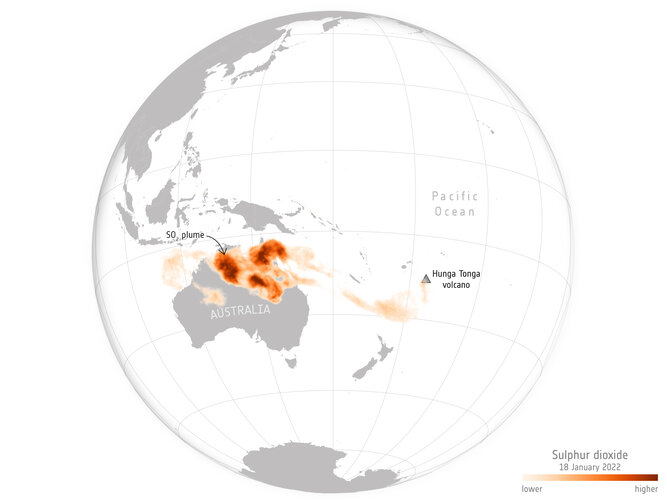The Hunga-Tonga-Hunga-Ha'apai volcano near Tonga in the South Pacific erupted with such force on 15 January that it is thought to be the biggest eruption recorded anywhere on the planet in 30 years.
Sending tsunami waves across the Pacific, the effects of this underwater eruption were felt as far away as the United States and Japan. Sonic booms from the eruption were heard across the Pacific and as far as Alaska, more than 9000 km away and the shockwave resulted in a noticeable jump in atmospheric pressure around the world.
The volcano spewed ash, gas and steam 30 kilometres into the atmosphere. Hazardous ash has smothered the island nation of Tonga, causing an unprecedented disaster.
While Tonga copes with the aftermath, this image illustrates how sulphur dioxide from the eruption is spreading across the planet. Using data from the Copernicus Sentinel-5P mission, the image shows the huge plume of sulphur dioxide on 18 January over Australia, more than 7000 km west of the eruption.
Copernicus Sentinel-5P is dedicated to monitoring air pollution by measuring a multitude of trace gases as well as aerosols – all of which affect the air we breathe.



 Image:
The Hunga-Tonga-Hunga-Ha'apai volcano near Tonga in the South Pacific erupted with such force on 15 January that it is thought to be the biggest eruption recorded anywhere on the planet in 30 years.
Image:
The Hunga-Tonga-Hunga-Ha'apai volcano near Tonga in the South Pacific erupted with such force on 15 January that it is thought to be the biggest eruption recorded anywhere on the planet in 30 years.